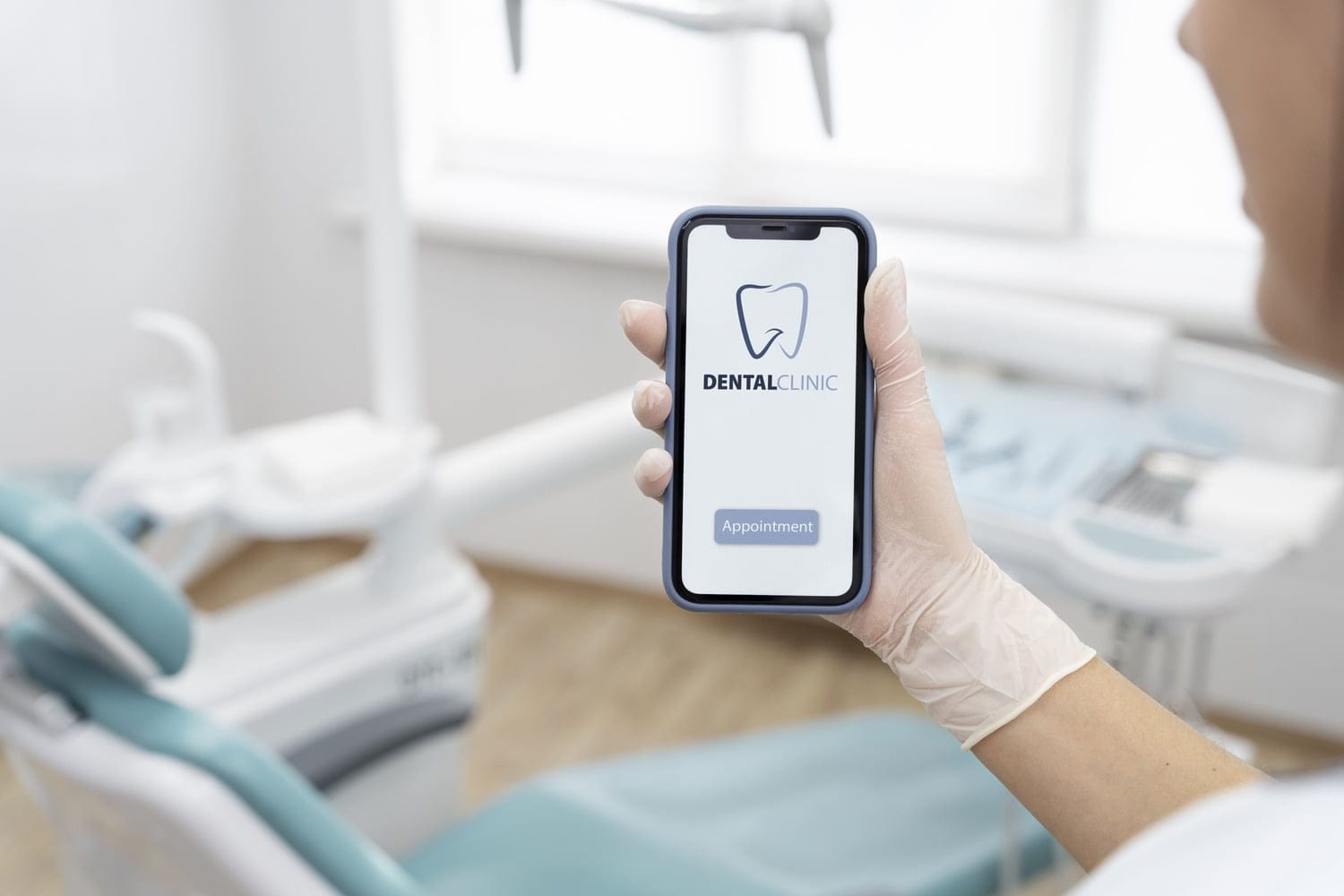Want to attract more patients to your dental practice? Local SEO is the key. By optimizing your online presence for local searches, you can make it easier for nearby patients to find you and discover the services you provide, driving growth and building a thriving practice.

Why Local SEO Matters for Dentists
Gone are the days of relying solely on word-of-mouth referrals or phone book listings. Here’s why local SEO deserves your full attention:
Patient Behavior
Studies show that over 80% of local searches on mobile devices convert to in-store visits (think dental appointments!). Local SEO ensures your practice shows up when these searches happen.
The Power of “Near Me”
Search terms like “dentist near me” or “[your city] emergency dentist” dominate local searches. Local SEO optimizes your online presence to capture these high-intent searches.
Standing Out from the Crowd
Competition in the dental field is fierce. Local SEO helps you outrank competitors and secure that coveted top spot in local search results.
The Local SEO Landscape for Dentists
Local SEO involves a multi-pronged approach, targeting both search engines and potential patients within your geographic area. Here’s a breakdown of the key players:
Google My Business (GMB)
Consider your GMB profile your online storefront. This free tool allows you to manage your practice’s listing on Google Maps and Search results. A well-optimized GMB profile with complete information, positive reviews, and engaging posts can significantly impact your local visibility.
Local Search Intent
Understanding user intent behind local searches is crucial. Patients searching for “dental implants” are likely in a research phase, while those searching for “emergency dental care” require immediate attention. Your website content and GMB profile should cater to both types of searchers.
Building a Strong Local SEO Foundation

A successful local SEO strategy requires a solid foundation. Here’s how to get started:
Keyword Research: The Cornerstone of Local SEO
Keyword research is the process of identifying the terms and phrases your target patients use to find dental services online. Tools like Google Keyword Planner, SEMrush, and Ahrefs can be invaluable for this step.
Focus on Local Keywords
Don’t just aim for broad terms like “dentistry.” Instead, target keywords with a local focus, like “[your city] family dentist,” “[your neighborhood] teeth whitening,” or “emergency dental care near [your zip code].”
Consider Patient Intent
Analyze search terms based on intent. Someone searching for “dental crown cost” is likely researching procedures, while those searching for “best cosmetic dentist” are further along the decision-making process.
Long-Tail Keywords
Include long-tail keywords (more specific, multi-word phrases) in your strategy. These keywords usually have lower competition but higher conversion rates. For example, “painless wisdom teeth extraction near [your city]” is a long-tail keyword with a high chance of attracting potential patients who require immediate care.
Local Keyword Variations
Consider different variations of local keywords, such as “dentists in [your city],” “dental office near me,” or “[your city] dental clinic.”
Competitive Analysis: Learn from the Best
Take a peek at your local competitors. Analyze their online presence and identify areas for improvement. What keywords are they ranking for? What content are they creating? Use this information to identify gaps in your own strategy and develop a competitive advantage.
Optimizing Your Online Presence for Local SEO
With your keyword research complete and a competitive landscape in mind, it’s time to optimize your online presence:
Claim and Verify Your Google My Business Profile
GMB is the cornerstone of local SEO for dentists. Ensure your profile is complete, accurate, and up-to-date. Include essential details like:
- Business Name: Match your exact practice name.
- Address: List your full address, including any suite numbers.
- Phone Number: Ensure your phone number is accurate and clickable.
- Website: Include your practice website URL.
- Category Selection: Choose the most relevant dental category (e.g., General Dentistry, Cosmetic Dentistry, Pediatric Dentistry).
- Business Description: Provide a concise and informative description of your practice and the services offered, incorporating relevant keywords.
- High-Quality Photos: Showcase your dental team, practice environment, and state-of-the-art equipment through compelling photos.
- Google Posts: Regularly share updates, promotions, or patient testimonials through Google Posts to increase visibility and engagement.
- Q&A: Respond to questions about your practice to build trust and provide valuable information.
On-Page Local SEO Optimization
- Website Content: Optimize your website content for local keywords. Ensure your homepage and service pages target relevant local terms while remaining informative and engaging for patients.
- Location Pages: If your practice has multiple locations, create dedicated pages for each one with unique content and local keywords.
- NAP Consistency: Maintain consistency in your Name, Address, and Phone Number (NAP) across your website, GMB, and other online directories. This helps search engines understand and verify your business location.
- Schema Markup: Implement schema markup to help search engines understand your business information and display it in rich snippets. This can improve your click-through rate and visibility in search results.
- Local Landing Pages: Create dedicated landing pages for specific services or locations. Optimize these pages with relevant keywords and location-specific information.
Citation Building
Citations are online listings of your business information across various directories and platforms. Consistent and accurate citations help search engines verify your business’s legitimacy and location.
- Local Directories: Claim and optimize your listings on popular directories like Google Maps, Yelp, Bing, Yellow Pages, and industry-specific platforms.
- Data Aggregators: Ensure your business information is accurate on data aggregators like Infogroup and Neustar Localeze.
- Consistency: Maintain consistent NAP information across all citations.
- Citation Monitoring: Regularly check for citation errors and inconsistencies and update them promptly.
Local Link Building
Building high-quality backlinks from relevant local websites can boost your local SEO efforts.
- Local Partnerships: Collaborate with other local businesses for link exchange opportunities.
- Community Involvement: Participate in local events, charities, or organizations to build relationships and earn backlinks.
- Patient Reviews: Encourage satisfied patients to leave reviews on your website and platforms like Google My Business. Positive reviews not only build trust but also contribute to your local SEO.
Content Marketing with a Local Focus
Creating valuable, informative content tailored to your local audience is essential for attracting and engaging potential patients.
- Local Blog Posts: Share articles about local dental events, community health initiatives, or patient testimonials.
- Local Guides and Resources: Create comprehensive guides to local dental care, including information on insurance providers, emergency dental care, and children’s dentistry.
- Video Content: Produce engaging videos about your practice, team, and services, incorporating local landmarks or points of interest.
Mobile Optimization
With the increasing use of smartphones, mobile optimization is crucial for local SEO. Ensure your website is mobile-friendly, loads quickly, and provides a seamless user experience on mobile devices.
Local Social Media Marketing
Leverage social media platforms to connect with your local community and promote your dental practice. Share engaging content, respond to comments and messages promptly, and run local promotions or contests.
Measuring and Improving Your Local SEO Efforts
Tracking your local SEO performance is essential for making data-driven decisions. Key metrics to monitor include:
- Local Search Rankings: Use keyword tracking tools like Google Search Console, SEMrush, or Ahrefs to monitor your position for relevant local keywords.
- Website Traffic: Analyze website traffic data using Google Analytics to identify trends and areas for improvement.
- GMB Insights: Utilize Google My Business Insights to track performance metrics like impressions, clicks, and website visits.
- Conversion Rates: Measure the number of website visitors who become patients.
- Patient Reviews: Monitor online reviews and respond to both positive and negative feedback.
Digital Sprig: Your Partner in Dental SEO Success
At Digital Sprig, we specialize in helping dental practices achieve their full potential through effective local SEO strategies. Our team of experts can help you with everything from keyword research and website optimization to citation building and reputation management. We understand the unique challenges faced by dental practices and are committed to delivering results that drive patient growth.
Contact us today to learn how we can help your dental practice dominate local search.
By implementing these strategies and partnering with a skilled dental SEO agency like Digital Sprig, you can significantly improve your online visibility, attract more patients, and build a thriving dental practice.







